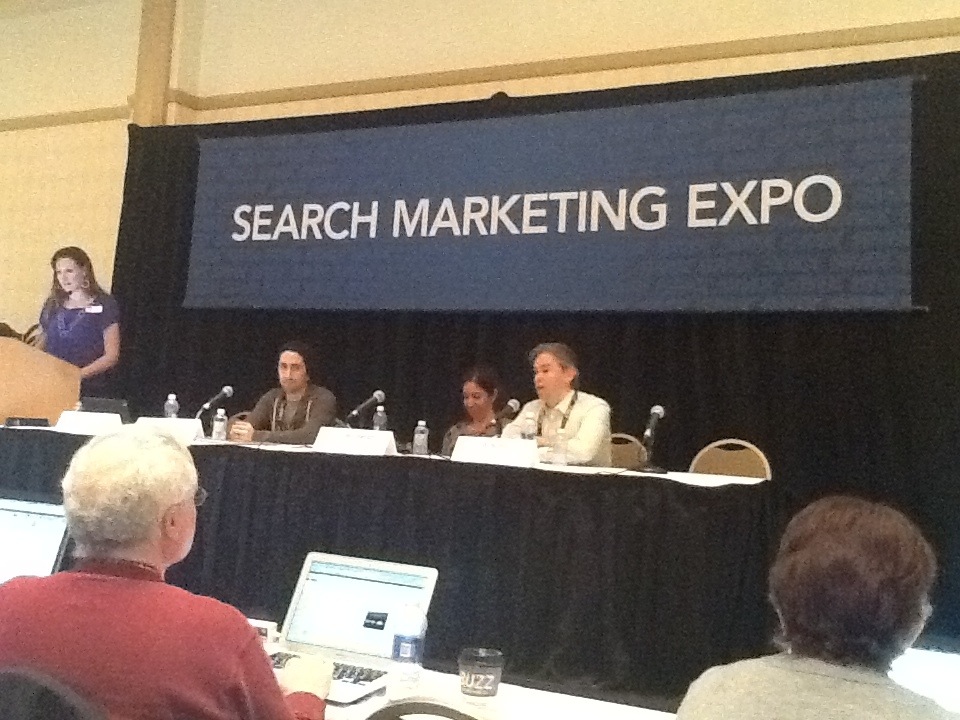From Authorship to Authority: Why Claiming Your Identity Matters #24C
This is my first session in the semantic SEO track, which means we’re going to be looking at the structured data that you’re giving search engines by claiming your identity.
Mike Arnesen @mike_arnesen says there’s a problem with creating content for stuff they don’t deserve to rank for. Like padding content for thin affiliate sites. The end result is bad search results. The results have gotten better as Google has rolled out updates like Panda. But it’s still the case we’ll find garbage in search results.
Great content comes from great authors. The Google authorship program is geared toward markup to recognize authors of content. We’re able to look at the people behind web pages and content. The ideas behind authorship aren’t new. It’s about trust, value, relationships. Baking credibility, trust and relationships into an algorithm is a good starting place.
Good content has traditionally been hard to spot before clicking on the result. Google updates have made search better, but algo updates aren’t enough. People want to connect to other people, so seeing people in SERPs is making the web better. In 2011 we saw the author of a result for the first time. We’d seen images pulled in for a few times, but a human face! That person wrote that web result! If highlighting authorship is good, rewarding authority is great.
Author Rank (AR) or agent rank is collective authority factors in the algorithm. PR-based rankings + AR = better results.
2005: Google patent filed for “Agent Rank”. 2011 extension patent on Author Rank referenced portable identity platform, a digital signature system that identifies who is writing online. Google+ is that portable identity platform, make Author Rank a possibility. The time is now to hop on board and get down with Google authorship.
“The true cost of anonymity might be irrelevance.” -Eric Schmidt
Bulletproof implementation:
1. “Contributor to” from G+ to website
2. Rel=author from content to Google+ OR
2. Rel=author from content to about page,
then rel=me from about page to Google+
There’s a Google+ community bit.ly/authorshipcommunity that these speakers set up to troubleshoot G+ authorship issues.
There are no shortcuts to building Author Rank. Google looks at a specific set of factors:
- Frequency, quickly your content shared
- How many endorsements on your content by experts
- How many comments by experts
Strategic and tactical things to remember when building AR:
Wikipedia page is your North Star example. Look at notability guidelines on Wikipedia because those are the kinds of things that make people notable.
Old fashioned networking, speaking at events, local meetups. Look at Klout and FollowerWonk since you’ll find people who are the experts. Talk to them online and add them to your network.
Can my company get authorship? Or publishers? A company with authorship goes against the premise of the program. It’s about people, people who are willing to put their identity on content because it’s those people who take pride in writing the best content.
Through authorship we can make the experience of our users an instant trust experience. Use it wisely and use it well.
 |
AJ Kohn @ajkohn has a deck called “The But and What If of Authorship and Author Rank.”
Can anyone be an author? Yes, any person can be an author. Bad, off-color content or pages that shouldn’t have authorship, those are edge cases. Fetch as Googlebot to speed things up if you’ve signed up for authorship and haven’t gotten in yet.
Does old content qualify? Yes. Put authorship in place and you can get authorship attached to old content.
Can any content be authored? No. Not everything deserves to have authorship. E-commerce companies wanting authorship on product pages = no. If there’s no person behind it, like transactional stuff. There may be other agents on that page like reviews and comments, but as for authors it doesn’t get it and that’s okay.
Can I get a ghostwriter? You can. But being an expert, an authority, value to customers, you have to put in the work. The end.
Can you have co-auttthors? Not yet. No luck with 2 people in the byline yet. Google sees it but in terms of assigning authors to presentation right now, no co-authors.
What happens when an author leaves? In reality it makes sense to keep authorship in tact, on both the publisher and writer’s part. Leaving doesn’t disavow authorship.
Can you change authors on a piece of content? You can. It’s worked in tests. At some point Google might catch on. But say someone has given you the virtual finger. You can change the author, but you should also change the content. Give it another writer and give it a refresh. He likens it to Dr. Who changing – same but different.
Advantages of authorship: Authorship snippet is a CTR magnet. Authorship bounce back bonus links; the last test shows a bounce back in a minute gives you more links from that author. He’s showing an example of one of the links in bounce back results is from an author’s slideshare, which doesn’t have authorship markup but OMG Google has figured it out by mapping profiles.
How do I know authorship is working? GWT Labs section shows authorship stats. You might get a welcome letter if you sign up to the program new. The Structured Data Testing tool will show you, he’s got bit.ly/authorbookmarklet so you don’t have to copy and paste links into the tool. Know that the Structured Data Testing tool is often wrong, so don’t trust it. Know that authorship is a very brittle markup and it breaks a lot. Don’t freak out if it disappears.
Bing has tags. Meh. It only works if you’re signed into Facebook and looking for friends. The social sidebar is hand picked so it’s hard to understand how they rank results.
Authorship is NOT the same as Author Rank. Authorship is the program where you identify yourself and claim posts. Author Rank is in the future, 100% not a direct ranking signal. It might happen in the future. What makes him think Author Rank is going to happen? Google said so in the launch announcement. They’ve acquired companies that ranks authorities. The Agent Rank patent was modified months before the launch of authorship. Lots of reasons it’s clear Google wants to use this data in ranking.
What about anonymity? Would you trust a doctor who introduced himself as SuperDoc887? People expect to know the source of the content to judge if it’s expert content.
There have been theories that @ing someone from a brand page might have an impact on authority, and that may be the case. Google’s looking it all like a link graph.
Lisa Weinberger @PearlyWrites will talk about the implementation of authorship at her content team at Bank Rate. She makes sure all the parts are included (SEO, social, content editor) toward a promotion goal and a fully vetted idea/target.
Brainstorming becomes content. Getting published is half the process. The other half of the process is the promotion. Knowing when a piece of content is going to publish is a big deal; they do pre-publish promotion.
Content Goal: decide the target, clarify the goal, create the strategy and execute. We think about why they’re creating the content. The general answer is to gain the most exposure with the creation of 1 piece of content or data.
Content Lifecycle – they ask these questions:
- Does it focus on our keyword needs?
- Can we get high value links?
- Will we get partner syndication?
- Can the content life cycle be extended?
- What’s trending in the community?
Magnet content is their goal: media pickup, syndication and attribution, on-page SEO value. To establish as an authority they also need authorities in their community. The engage with influencers daily. Keep the conversation going.

LEAVE A REPLY










